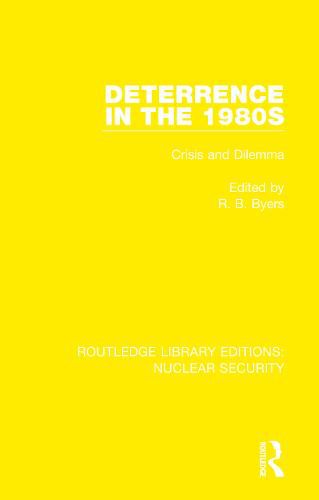Readings Newsletter
Become a Readings Member to make your shopping experience even easier.
Sign in or sign up for free!
You’re not far away from qualifying for FREE standard shipping within Australia
You’ve qualified for FREE standard shipping within Australia
The cart is loading…






Originally published in 1985, Deterrence in the 1980s offers analyses by leading American and Canadian scholars and decision-makers in the field of strategic studies of the current problems and dilemmas of contemporary international security with deterrence, nuclear and conventional, as the unifying conceptual theme. Deterrence as theory, as history, as psychology, as politics, as ethics and as policy is addressed. The authors outline the complexities of deterrence, in theory and in practice, and offer proposals regarding the future operationalization of deterrence in order both to reassure Western publics and to enhance Western and international security. Soviet-American strategic relations, along with the problems posed for the Western Alliance, are analysed.
Within the context of NATO, the dilemmas, for both Europe and North America, of extended deterrence are raised. Despite the current crisis of deterrence, no other security strategy appears viable as long as nuclear weapons are retained for purposes of national security. However, current trends in the operationalization of deterrence - nuclear-war fighting capabilities - have raised concerns about the future of deterrence.
$9.00 standard shipping within Australia
FREE standard shipping within Australia for orders over $100.00
Express & International shipping calculated at checkout
Originally published in 1985, Deterrence in the 1980s offers analyses by leading American and Canadian scholars and decision-makers in the field of strategic studies of the current problems and dilemmas of contemporary international security with deterrence, nuclear and conventional, as the unifying conceptual theme. Deterrence as theory, as history, as psychology, as politics, as ethics and as policy is addressed. The authors outline the complexities of deterrence, in theory and in practice, and offer proposals regarding the future operationalization of deterrence in order both to reassure Western publics and to enhance Western and international security. Soviet-American strategic relations, along with the problems posed for the Western Alliance, are analysed.
Within the context of NATO, the dilemmas, for both Europe and North America, of extended deterrence are raised. Despite the current crisis of deterrence, no other security strategy appears viable as long as nuclear weapons are retained for purposes of national security. However, current trends in the operationalization of deterrence - nuclear-war fighting capabilities - have raised concerns about the future of deterrence.